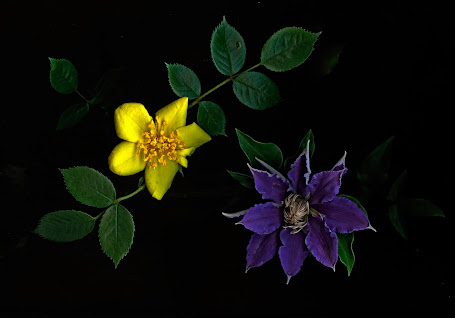 |
| Rosa 'Emily Louise' 9 December 2021 |
Today is an anniversary that I cannot celebrate. My Rosemary died a year ago today.
Rosemary had this innate ability to always surprise me. In our-52-year marriage I could never predict any of her actions (all intelligent I would always find out). But she did change a tad in those years.
She surprised me today.
When we first started gardening in our large corner garden in Kerrisdale in 1986 she exiled any flower that was yellow, orange or red. Our new roses (and the new old roses) had to be white. She loved blue so we had aconitum, hydrangeas and gentians. But she did begin to accept my preference for pink roses and old red roses that aged into marvellous metallic purples.
When I brought Rosa ‘Westerland’ home, Rosemary slowly warmed to its orange and its synthetic apricot fragrance.
It was at the garden of former Vancouver Rose Society President Janet Wood (now gone) that we say Rosa ‘Mrs. Oakley Fisher’ and a patio rose (so did Wood describe the tiny little rose with that unromantic epithet) Rosa ‘Emily Louise’. Both were yellow and both eventually found a home in our garden.
Mellow Yellow & Electrical Bananas
When we gazed on Emily Louise we invariably connected her to Janet Wood. It was a rose that reminded us fondly of a friend who was now dead.
 |
| Rosa 'Emily Louise'& Clematis 'Bijou' 25 May 2021 |
So today, 9 December 2021, what am I to make of the only rose in bloom being Emily Louise? I see it and I smile as it is one more of those posthumous gifts that keep coming. It is as if Rosemary is telling me, “I am not here but I am.”
But my smile fades as now this happy little rose reminds me of two persons who are gone.
Below a lovely short story The Yellow Rose by Jorge Luís Borges
“The Yellow Rose”
Jorge Luis Borges
Translated by Andrew Hurley
It was neither that afternoon nor the next that Giambattista Marino died— that illustrious man proclaimed by the unanimous mouths of Fame (to use an image that was dear to him) as the new Homer or the new Dante—and yet the motionless and silent act that took place that afternoon was, in fact, the last thing that happened in his life. His brow laureled with years and glory, the man died in a vast Spanish bed with carven pillars. It costs us nothing to picture a serene balcony a few steps away, looking out toward the west, and, below, marbles and laurels and a garden whose terraced steps are mirrored in a rectangular pool. In a goblet, a woman has set a yellow rose; the man murmurs the inevitable lines of poetry that even he, to tell the truth, is a bit tired of by now:
Porpora de’giardin, pompa de’prato,
Gemmadi primavera, occhio d’aprile…
Then the revelation occurred. Marino saw the rose, as Adam had seen it in Paradise, and he realized that it lay within its own eternity, not within his words, and that we might speak about the rose, allude to it, but never truly express it, and that the tall, haughty volumes that made a golden dimness in the corner of his room were not (as his vanity had dreamed them) a mirror of the world, but just another thing added to the world’s contents.
Marino achieved that epiphany on the eve of his death, and Homer and Dante may have achieved it as well.